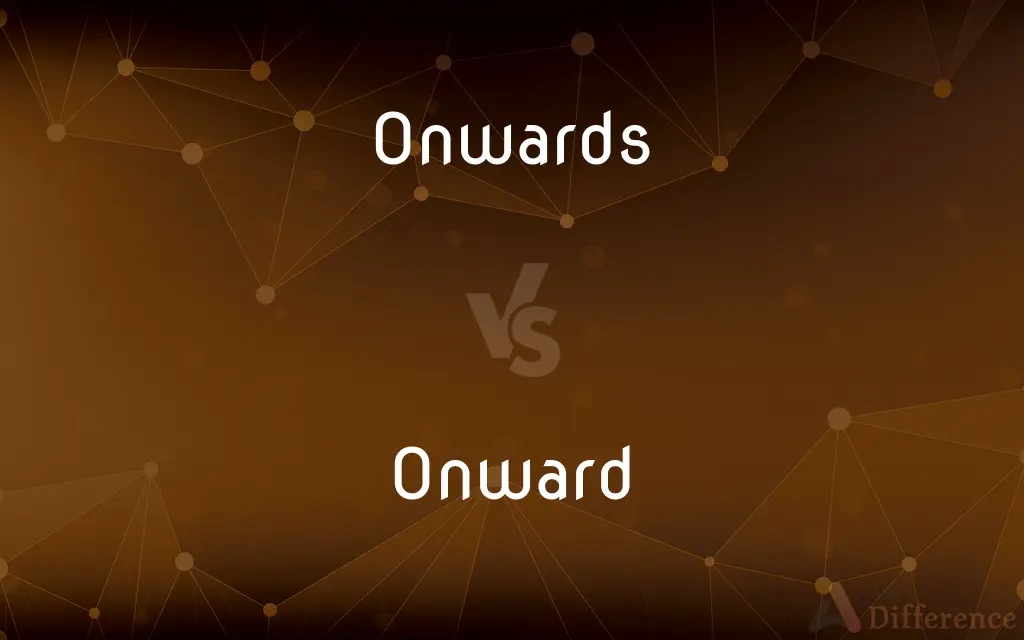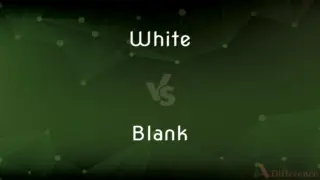Onwards vs. Onward — What's the Difference?
By Tayyaba Rehman — Updated on November 7, 2023
"Onward" and "Onwards" both mean moving forward or continuing, but "onwards" is more common in British English.

Difference Between Onwards and Onward
Table of Contents
ADVERTISEMENT
Key Differences
"Onward" and "Onwards" are terms that often confound even seasoned English speakers due to their subtle difference and interchangeable usage. "Onward" can be understood as an adverb describing the action of proceeding in a forward direction, often associated with a continuous or advancing movement. It carries a sense of progression from the current point in time or space. "Onwards," while carrying the same fundamental meaning as "onward," is frequently used in British English and can feel more emphatic or formal, often used in the context of moving forward in a figurative or literal sense.
In literary and formal contexts, "onward" and "onwards" are sprinkled throughout prose and poetry to convey a journey's continuation, without indicating an ending. "Onward" might be favored for its brevity and directness, often used in American English. Conversely, "onwards" can be seen as a variant that adds a slight nuance or rhythm to the text, preferred in British English but understood globally.
When it comes to spoken English, "onward" and "onwards" serve the same function, providing a cue for progression or advancement. "Onward" may sound more concise and modern to American ears, while "onwards" might carry a classic or more formal tone. Despite their nuances, both words are understood to indicate movement towards a point or goal.
Usage of "onward" and "onwards" also extends beyond the literal to the metaphorical, often embodying personal, professional, or intellectual growth. "Onward" can suggest a personal journey towards improvement or development, while "onwards" might be used to emphasize the sustained, ongoing nature of such progress.
The difference between "onward" and "onwards" might not lie strictly in grammar or definition but rather in regional preference and stylistic choice. "Onward" is commonly used in American English, whereas "onwards" finds its place in British English, both conveying the same idea of movement forward.
ADVERTISEMENT
Comparison Chart
Usage in English Variants
More common in British English.
More common in American English.
Stylistic Connotation
Often implies a formal or emphatic continuation.
Perceived as more modern and direct.
Endings
Typically does not vary in form.
Similarly, does not vary in form.
Syllables
Two-syllable word, which may affect the rhythm in speech or writing.
One-syllable word, often providing a concise sound.
Usage in Literature
Used with a slightly more formal or traditional tone.
Used in a straightforward, contemporary context.
Compare with Definitions
Onwards
Toward a point ahead in space or time; forward.
From that moment onwards, the team's morale soared.
Onward
Used to suggest advancement toward a goal.
Her career moved onward and upward.
Onwards
Used to indicate moving forward in a narrative or argument.
Onwards, the story takes a dramatic turn.
Onward
Toward a point ahead in space or time; forward.
The explorers moved onward into the unknown.
Onwards
From a particular time or event into the future.
He will be taking over the project from Monday onwards.
Onward
From a particular time or event into the future.
The new policy takes effect from July onward.
Onwards
In a continuing forward direction; ahead.
We must push onwards despite the challenges.
Onward
Indicating progression in a task or journey.
They worked onward through the night.
Onwards
Indicating continuation of a situation or state.
The legacy of her work will carry onwards for generations.
Onward
In a continuing forward direction; ahead
She stumbled onward
Onwards
Onward
Onward
(of a journey) continuing or moving forward
Informing passengers where to change for their onward journey
The onward march of history
Onwards
Onward.
Onward
Moving or tending forward.
Onwards
In a forward direction;
Go ahead
The train moved ahead slowly
The boat lurched ahead
Moved onward into the forest
They went slowly forward in the mud
Onward
In a direction or toward a position that is ahead in space or time; forward.
Onward
(not comparable) Moving forward.
There was an onward rush as the gates opened.
Onward
Advanced in a forward direction or toward an end.
Onward
In a forward direction.
Onward
To keep going; to progress or persevere.
Onward
Moving in a forward direction; tending toward a contemplated or desirable end; forward; as, an onward course, progress, etc.
Onward
Advanced in a forward direction or toward an end.
Within a while, Philoxenus came to see how onward the fruits were of his friend's labor.
Onward
Toward a point before or in front; forward; progressively; as, to move onward.
Not one looks backward, onward still he goes.
Onward
Moving toward a position ahead;
Forward motion
The onward course of events
Onward
Forward in time or order or degree;
From that time forth
From the sixth century onward
Onward
In a forward direction;
Go ahead
The train moved ahead slowly
The boat lurched ahead
Moved onward into the forest
They went slowly forward in the mud
Onward
In a continuing forward direction; ahead.
He pressed onward despite the snow.
Common Curiosities
Do onwards and onward have different grammatical functions?
No, they function the same grammatically as adverbs.
Are onwards and onward interchangeable?
Yes, they can be used interchangeably, though "onwards" is more common in British English.
Can onwards and onward be used at the end of a sentence?
Yes, both can be used to conclude a sentence indicating direction or continuation.
Is there a difference in meaning between onwards and onward?
No, they both mean moving forward or continuing.
Is one more formal than the other?
"Onwards" can sound more formal or emphatic, especially in British English.
Are there contexts where one is preferred over the other?
Yes, "onward" is generally preferred in American English, while "onwards" is favored in British English.
Can either word be used in historical contexts?
Yes, both are used to discuss progression in historical narratives.
Can onwards and onward be used in academic writing?
Yes, both can be used appropriately in academic contexts.
How do onwards and onward relate to time?
Both can be used to refer to moving forward from a specific point in time.
Can both words be used in a metaphorical sense?
Yes, both can metaphorically suggest progress or movement in non-physical contexts.
Is there a plural form for onward or onwards?
No, they are invariable as adverbs.
Are onwards and onward used differently in different English-speaking countries?
Yes, usage can vary between American and British English.
Can onward be used as an adjective?
No, it is not typically used as an adjective.
Are there any synonyms for onwards and onward?
Yes, words like "forward," "ahead," and "forth" are synonyms.
Is onward or onwards more commonly used in idiomatic expressions?
Neither is particularly idiomatic, but both are used in expressions about moving forward.
Share Your Discovery

Previous Comparison
White vs. Blank
Next Comparison
Summit vs. MeetingAuthor Spotlight
Written by
Tayyaba RehmanTayyaba Rehman is a distinguished writer, currently serving as a primary contributor to askdifference.com. As a researcher in semantics and etymology, Tayyaba's passion for the complexity of languages and their distinctions has found a perfect home on the platform. Tayyaba delves into the intricacies of language, distinguishing between commonly confused words and phrases, thereby providing clarity for readers worldwide.
















































